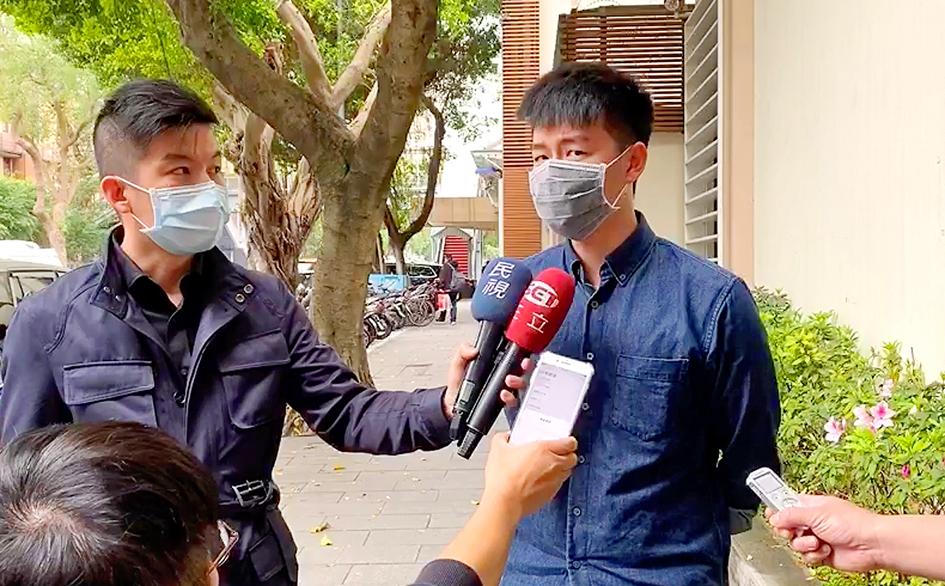The Taiwan People’s Party (TPP) yesterday rejected a local news report saying that its staff have been using the party’s caucus office in the Legislative Yuan as their working space, while confirming that it has made progress in finding new party headquarters.
The Chinese-language Mirror Media magazine reported that nearly 20 TPP party officials and staff have been “parasitizing” the party’s caucus office.
The magazine said it had received a tip-off that as the TPP’s workers are not employees of the Legislative Yuan, they do not have the work card required to enter the Legislative Yuan’s caucus office building, but the party provided a list of its staff to the building’s security and they were given permission to enter daily.

Photo courtesy of Taiwan People’s Party
The TPP staff who used the caucus office are from the party’s advertising department, and a video uploaded by the party on YouTube, in which an advertising department employee introduced the party’s secretary general, was filmed there, the magazine said.
Taipei Mayor Ko Wen-je (柯文哲), the TPP chairman, has often stressed the importance of financial discipline, but allowing the party’s workers to use the caucus office — for which the electricity and phone bills are paid by the Legislative Yuan — seemed to be taking advantage of the government, the report said.
TPP spokesman Tsai Chun-wei (蔡峻維) said that all the people who are working at the office support the TPP legislative caucus by quickly replying to public opinions and assisting its operations.
The party rejects the claim that it is a parasite in the Legislative Yuan, as that is inconsistent with the facts, he said.
The TPP has been searching for a bigger space for its headquarters since last year, but many landlords have concerns over renting to political parties, Tsai said, adding that some progress has been made in finding a property, and the details would be announced if further progress is made.

The Ministry of Economic Affairs has fined Taobao NT$1.2 million (US$36,912) for advertisements that exceed its approved business scope, requiring the Chinese e-commerce platform to make corrections in the first half of this year or its license may be revoked. Lawmakers have called for stricter enforcement of Chinese e-commerce platforms and measures to prevent China from laundering its goods through Taiwan in response to US President Donald Trump’s heavy tariffs on China. The Legislative Yuan’s Finance Committee met today to discuss policies to prevent China from dumping goods in Taiwan, inviting government agencies to report. Democratic Progressive Party Legislator Kuo Kuo-wen (郭國文) said

The Ministry of Economic Affairs has fined Taobao NT$1.2 million (US$36,900) for advertisements that exceeded its approved business scope and ordered the Chinese e-commerce platform to make corrections in the first half of this year or its license would be revoked. Lawmakers have called for stricter supervision of Chinese e-commerce platforms and more stringent measures to prevent China from laundering its goods through Taiwan as US President Donald Trump’s administration cracks down on origin laundering. The legislature’s Finance Committee yesterday met to discuss policies to prevent China from dumping goods in Taiwan, inviting government agencies to report on the matter. Democratic Progressive Party

Taiwan and its Pacific ally Tuvalu on Tuesday signed two accords aimed at facilitating bilateral cooperation on labor affairs, according to Taiwan’s Ministry of Foreign Affairs (MOFA). The governments inked two agreements in Taipei, witnessed by Foreign Minister Lin Chia-lung (林佳龍) and visiting Deputy Tuvaluan Prime Minister Panapasi Nelesone, MOFA said in a news release. According to MOFA, the agreements will facilitate cooperation on labor issues and allow the two sides to mutually recognize seafarers’ certificates and related training. Taiwan would also continue to collaborate with Tuvalu across various fields to promote economic prosperity as well as the well-being of their

Sung Chien-liang (宋建樑), who led efforts to recall Democratic Progressive Party (DPP) Legislator Lee Kun-cheng (李坤城), was released on bail of NT$80,000 today amid outcry over his decision to wear a Nazi armband to questioning the night before. Sung arrived at the New Taipei District Prosecutors’ Office for questioning in a recall petition forgery case last night wearing a red armband bearing a swastika, carrying a copy of Adolf Hitler’s Mein Kampf and giving a Nazi salute. Sung left the building at 1:15am without the armband and covering the book with his coat. Lee said today that this is a serious